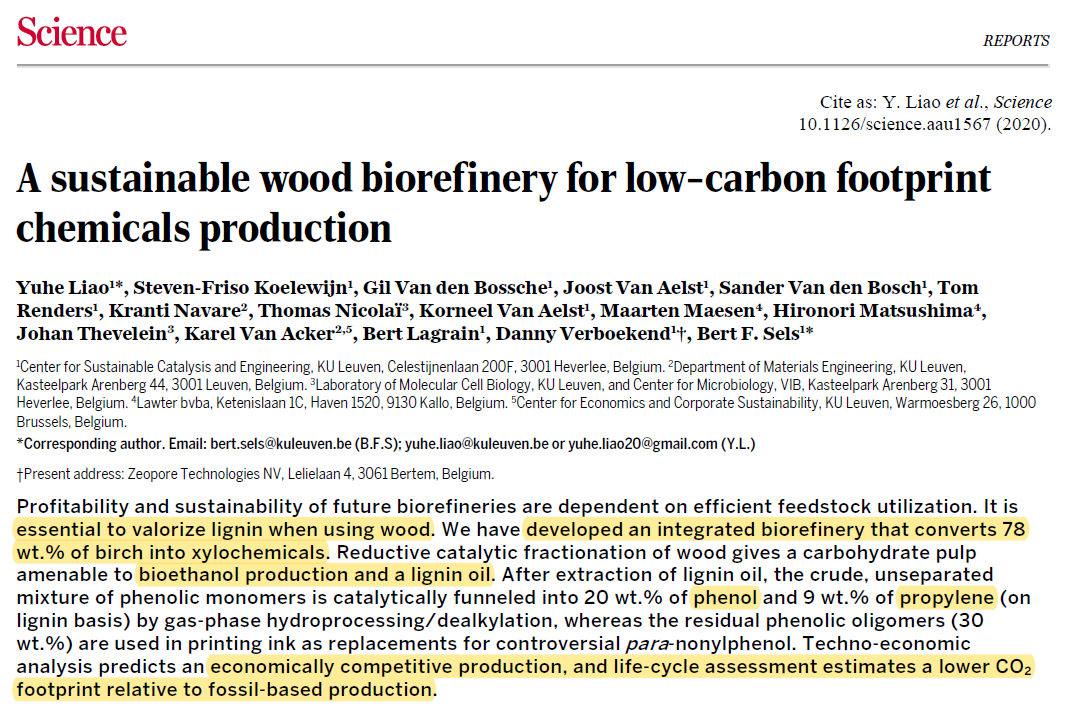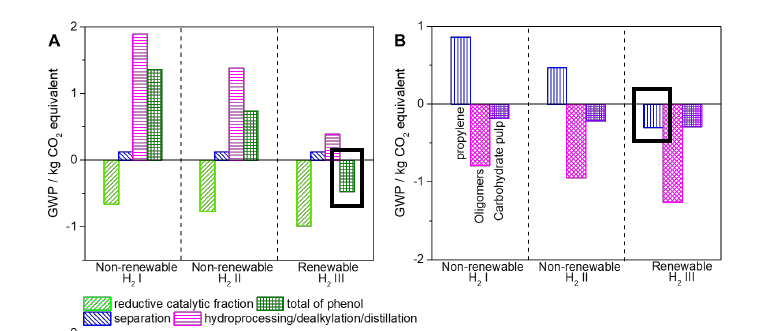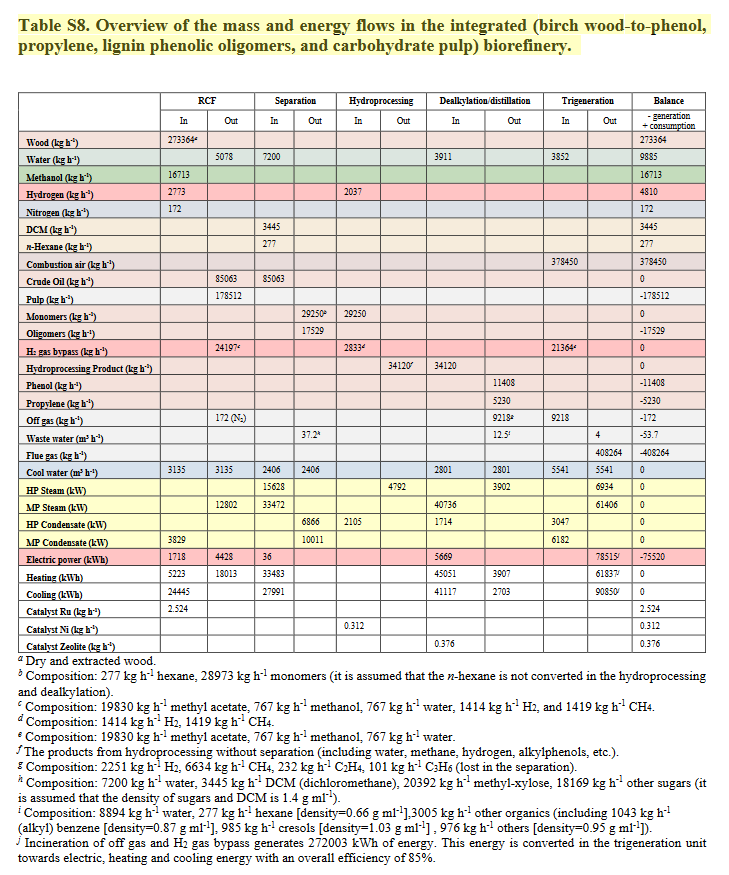- What the ⁉️
- Current production process?
- New method:
- Upscaling: what can we get from 1 tonne of wood (424kg cellulose & 210kg lignine) ?
- How can this help us combat climate change?
- Current phenol/propylene production emissions (🧙♂️hock process) :
- Newly proposed phenol/propylene production GHG emissions (💡Sels-team):
- New production process: 😒lazy mode
- New production process: 🌬️renewables mode
- New production process: 🌳happy forest mode
- New production process: 🌬️renewables &🌳happy forest mode
- 😎Getting real 😎What about building a plant that:
New 🎉article [https://t.co/6HhczPncEj] out from the Sels Group research team @LeuvenU, conceptualising a sustainable wood biorefinery for low–carbon footprint chemicals production
🌳birch wood➡️🧪propylene, phenolic oligomers and phenol
@BartMuys @JoostVanAelst @KarelVA https://t.co/tLB71cy5re


What the ⁉️
Phenol/propylene: precursors for Bisphenol A (plastics), nylon rope [https://t.co/Qz0h5ITQ9g], foams/tires [https://t.co/SsViHz8ggv], detergents [https://t.co/zOZQOEoo31], etc, etc, …
⚠️Projected phenol demand = 13.5 million t in 2026
https://t.co/s8Q2BJwcbU https://t.co/yGbRtPllGr

Current production process?
…is called the 🧙♂️Hock process.
Downsize(s!)❓
- ⚫️fossil/non-renewable feedstock⚫️ methane!
- dangerous catalysts: hydroperoxide (🧨explosive) / sulph. acid (corrosive)
- yield of (only!) 5 %
- overproduction of acetone
New method:
😕Challenge
converting lignine (wood lignucellulose-constituent) -> phenol. Existing tech: only 3 % weight% yield
💡Found solution
phenol production from lignine with 20 and 50 weight% yield for respectively soft- and hardwood feedstocks
https://t.co/mTF2S1ohWd https://t.co/MXPnGfMmCe

Upscaling: what can we get from 1 tonne of wood (424kg cellulose & 210kg lignine) ?
1⃣New biorefinery process:
-> 311 kg crude oil -> 106 kg monomers
2⃣From monomers (using hydrogen, H2) :
–> 41kg phenol + 19,5 kg propylene + 0.8 kg ethylene https://t.co/zeiU1UvfP3

How can this help us combat climate change?
Current phenol/propylene production emissions (🧙♂️hock process) :
Global Warming Potential when producing from fossil feedstock:
- Phenol = ⚫️1.73 gCO2eq
- Propylene = ⚫️1.47 gCO2eq
[https://t.co/VX5wigjrjQ] https://t.co/lbkbNaqgD6

Newly proposed phenol/propylene production GHG emissions (💡Sels-team):
Assumptions:
🅰️production wt standard non-renewable H2 (8.2 kgCO2/kgH2)
🅱️standard Ecoinvent v3.3 forest management
- Phenol = 💡0.74 gCO2eq
- Propylene = 💡0.47 gCO2eq
[https://t.co/UWsigfoWvl] https://t.co/M3QgmJ659h

New production process: 😒lazy mode
Assumptions:
🅰️higher GWP H2 (11.9 kgCO2/kgH2)
🅱️standard Ecoinvent v3.3 forest (-0.45 kgCO2/kgwood)
- Phenol = 😒1.35 gCO2eq
- Propylene = 😒0.86 gCO2eq
[https://t.co/rlpA7X5axG] https://t.co/YkKcmXHogR

New production process: 🌬️renewables mode
Assumptions:
🅰️renewable H2 (0.97 kgCO2/kgH2)
🅱️standard Ecoinvent v3.3 forest management
- Phenol = 🌬️-0.47 gCO2eq
- Propylene = 🌬️-0.30 gCO2eq
(➖ sign = CO2 storage in oligomers and carbohydrate pulp)
[https://t.co/rlpA7X5axG] https://t.co/V2ia7GQBDA

New production process: 🌳happy forest mode
Assumptions:
🅰️standard non-renewable H2 (8.2 kgCO2/kgH2)
🅱️sustainable forest management (-1.78 kgCO2/kgwood)
- Phenol = 🌳-3.13 gCO2eq
- Propylene = 🌳-2.00 gCO2eq
[https://t.co/rlpA7X5axG] https://t.co/hAOjqtof6k

New production process: 🌬️renewables &🌳happy forest mode
Assumptions:
🅰️renewable H2 (0.97 kgCO2/kgH2)
🅱️sustainable forest management (-1.78 kgCO2/kgwood)
- Phenol = 🌬️🌳-3.13 gCO2eq
- Propylene = 🌬️🌳-2.00 gCO2eq
[https://t.co/rlpA7X5axG] https://t.co/cXVk0KJydu

😎Getting real 😎What about building a plant that:
takes in 273 ton (t) of wood
& produces:
11.5t phenol (99% purity) 5.2t propylene (99.9% purity) 17t lignin olimers 178t pulp 75 MWh
…per year?
Mass & Energy Balance: https://t.co/3SujRWAn6C https://t.co/v9V3np1sTr


First concern/question: Is there enough wood for this type of plant?
According to Prof. Sels - because of the shrinking paper industry in Europe, “there is currently a surplus of wood production in Europe” https://t.co/NZcFpm4RnB
Second question: how much would this cost?
Total CAPEX: 477 MM€ https://t.co/f7lZfws2Jy
With:
- current/fixed prices/infrastructure cost
- 20 year project lifetime
- 8766 h operation per year
- depreciation in 10 years
- 50% income tax
Full list: https://t.co/caAgJbx9ab https://t.co/7GwayPS4fV

Note: the cost and profitability are mostly dependent on the product and feedstock prices [https://t.co/h8K6rXWdBl]
Assumed product/manufacture prices: see attached figure & https://t.co/bKotCiq0Gf + https://t.co/gNAznRRyik https://t.co/QLyyFTSgnY




A good example of the high potential of biomass utilization in the refining industry recognized by the EU High Level expert Group on energy-intensive industries [https://t.co/DzVDubmRao] in its latest masterplan report [https://t.co/XQ4KxWxHhK] https://t.co/k1p0sdg7Rh
